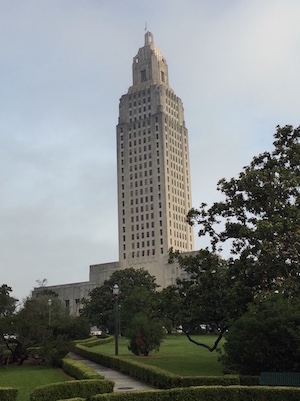Jim Beam column: Compromise is still possible
Published 6:20 am Wednesday, June 7, 2023

- Louisiana legislators at the state Capitol will have started putting the finishing touches on their fiscal session that has to end by 6 p.m. Thursday.(American Press photo).
The U.S. Congress and the Louisiana Legislature within a week’s time proved compromise still works in the halls of government. However, there is a major difference. Congress raised the country’s debt limit and the Legislature raised its spending limit.
Congress will print more money to add to its current $31.4 trillion debt. The Legislature has to have a balanced budget, but it has a $2.2 billion surplus to spend on many state needs.
The Advocate reported that Senate President Page Cortez, R-Lafayette, said raising the state spending limit by $250 million this year and $1.4 billion next year will allow for full spending on roads, bridges, ports and the like.
Cortez added that increased spending would also leave money for future infrastructure projects like new bridges at Lake Charles and Baton Rouge. The Lake Charles bridge currently has $800 million towards the $1.6 billion needed to build the bridge and its approaches.
Louisiana legislators have to end their current fiscal session by 6 p.m. Thursday and still have to wrap up some details before calling it quits. It cleared a major hurdle Monday when the House Appropriations Committee voted 21-3 to raise the state spending cap. It sent Cortez’s spending measure to the full House for a vote.
Cortez deserves much of the credit for the compromise worked out Monday. He held firm on the need to use surplus money to finance essential infrastructure and other work. A state budget the House sent to the Senate didn’t raise the spending limit and was going to use much of the surpluses that it could spend on paying off retirement debt.
Cortez was effective in detailing the many road, bridge and other projects that were either started or completed when lawmakers raised the spending limit only twice — in 2007 and 2008.
Rep. Jack McFarland, R-Winnfield, and chairman of the House Conservative Caucus, came up with the reduced expenditure limits from $500 million this year and $1.8 billion next year. Cortez said fiscal staff realized the limits could be increased by a smaller margin and still meet the state’s financial needs.
“We were high on both,” Cortez said. “We’re in good shape.”
A final version of the budget sent to the full Senate by its Finance Committee still proposes paying down $441 million in retirement debt. Rep. Jerome “Zee” Zeringue, R-Houma, and chairman of the House Appropriations Committee, calls that still “a good start.”
The state Board of Elementary and Secondary Education (BESE) is requesting a $282 million increase in the school funding formula. The Center Square said that includes $197 million in $2,000 raises for teachers, $1,000 for support workers, and stipends for teachers in certain schools and leadership roles.
Cortez said the state could fund the BESE increase along with supplemental pay for law enforcement officers, both recurring expenses, without busting the spending cap with cuts to other areas.
The Louisiana Municipal Association, the Police Jury Association, and the Rural Hospital Association support raising the spending limit. Those extra funds would be used for roads, bridges, airports, and water and sewer systems in the state’s parishes and cities.
Business interests oppose increasing the spending limit. They include the Louisiana Association of Business and Industry (LABI), Americans for Prosperity Louisiana, the Louisiana Family Forum, the Pelican Institute, and others in opposition.
Jim Patterson, president of LABI, said, “Our feeling is the budget cap is there for a reason … and the government should live within its means.”
Louisiana has seen its road and bridge construction and maintenance backlog grow to $14 billion and the need to finance some of the $1.8 billion backlog in dilapidated university buildings. It also needs $55 billion to rebuild the coast.
The state had a decade of severe budget problems before Gov. John Bel Edwards and the current Legislature took office in 2016. Thanks to another compromise worked out in 2018 the governor and lawmakers were on the same page in backing a 0.45% increase in the state’s 4% sales tax.
Conservatives are worried that increasing the spending limit will result in budget shortfalls when that tax increase goes off the books in 2025. However, the state has had increasing revenues in recent years with an additional surplus expected next year.
State government is supposed to do the things planned with current surplus funds. Too much of what it should do has been postponed in the past because of those budget shortfalls.
Thanks to Gov. John Bel Edwards, legislative leaders, and lawmakers with vision, this session’s financial success is a great way for them to wrap up their eight years of service.
| ReplyForward |





